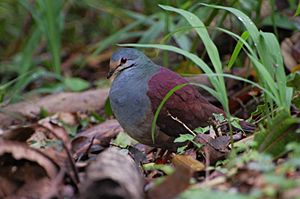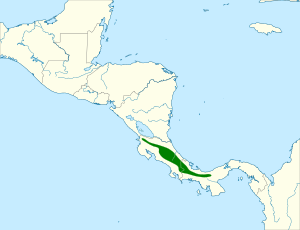Buff-fronted quail-dove facts for kids
Quick facts for kids Buff-fronted quail-dove |
|
|---|---|
 |
|
| Conservation status | |
| Scientific classification |
|
| Kingdom: | Animalia |
| Phylum: | Chordata |
| Class: | Aves |
| Order: | Columbiformes |
| Family: | Columbidae |
| Genus: | Zentrygon |
| Species: |
Z. costaricensis
|
| Binomial name | |
| Zentrygon costaricensis Lawrence, 1868
|
|
 |
|
| Script error: The function "autoWithCaption" does not exist. | |
| Synonyms | |
|
|
Script error: No such module "Check for conflicting parameters".
The buff-fronted quail-dove is a beautiful bird found in the forests of Costa Rica and Panama. It's also known as the Costa Rican quail-dove (Zentrygon costaricensis). This bird is part of the Columbidae family, which includes all kinds of doves and pigeons. It's a shy bird that likes to stay hidden on the forest floor.
Contents
About Its Name
Scientists give every animal a special name. The buff-fronted quail-dove's scientific name is Zentrygon costaricensis. Over time, scientists sometimes change how they group animals. This bird was first put in the Geotrygon group, then Oreopeleia, and now Zentrygon. It's the only type of its kind in its specific group.
What Does It Look Like?
The buff-fronted quail-dove is about 24 to 28 cm (9.4 to 11.0 in) long. That's about the length of a ruler! Males are a bit heavier than females.
Its head, neck, and chest are a medium gray color. The back of its neck and upper back have a hint of green. Its belly fades to a brownish color. The back, wings, and tail are a deep maroon.
This bird has a cool pattern on its head. Its cheeks are light gray, with thin black stripes above and below them. These stripes go just past its eye. The bird's name comes from its forehead, which is a light, creamy "buffy" color. Its eyes are brown with a thin red ring around them. Its legs are a bright coral-red, and its beak is dull brown with a reddish part near its face.
Young buff-fronted quail-doves look a bit different. Their head and neck are dusky gray with a green shine. Their upper parts are dull brown with faint dark bars and cinnamon tips on their feathers. Their undersides have gray and cinnamon bars, and their belly is buff-colored.
Where Does It Live?
The buff-fronted quail-dove lives all year round in parts of Costa Rica and western Panama. You can find it in the Talamancan montane forests, which are mountain forests.
It lives at high elevations. In Costa Rica, it's found from 1,000 to 3,000 m (3,300 to 9,800 ft) above sea level. In Panama, it lives from 1,200 to 3,000 m (3,900 to 9,800 ft) high.
How Does It Behave?
Finding Food
The buff-fronted quail-dove usually looks for food alone or in pairs. It searches through the fallen leaves on the forest floor. We don't know everything it eats, but its diet includes fruits, seeds, and probably insects too.
Raising Young
Scientists don't know much about how this bird raises its young. Only one nest has been described. It was a flat platform made of twigs, moss, and liverworts. The nest was almost 4 m (13 ft) (about 13 feet) off the ground on a branch of a tall bush. It held one baby bird.
Its Song
The buff-fronted quail-dove has a unique song. It sounds like a "low, hollow hoOOOO". The sound gets louder towards the end and rises slightly.
Its Conservation Status
The IUCN (International Union for Conservation of Nature) says the buff-fronted quail-dove is a species of "Least Concern." This means that even though it lives in a fairly small area, it's quite common there. Its population seems to be stable, so it's not currently at risk of disappearing.
See also
In Spanish: Paloma perdiz costarricense para niños
 | Jewel Prestage |
 | Ella Baker |
 | Fannie Lou Hamer |


